Chiku Zulu
Nurse, mother, community support worker, volunteer
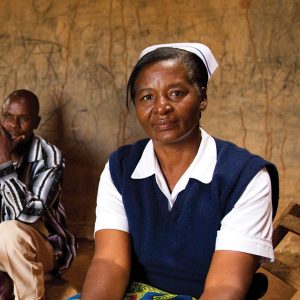 Chiku is a nurse working with HIV programmes in Chikankata. She is fifty years old and separated from her husband. She has four children – two girls and two boys. Her eldest is twenty and works in the laboratory in the local hospital while her second born is studying to be a mechanic. Her first daughter was born in 1990 and is training to be a secretary and her last child was born in 1996 and has just started secondary school.
Chiku is a nurse working with HIV programmes in Chikankata. She is fifty years old and separated from her husband. She has four children – two girls and two boys. Her eldest is twenty and works in the laboratory in the local hospital while her second born is studying to be a mechanic. Her first daughter was born in 1990 and is training to be a secretary and her last child was born in 1996 and has just started secondary school.
Most people in Chikankata are subsistence farmers. Some grow vegetables, sugar cane, maize and ground nuts. Most people sell any excess crops they have, but most of their production is used to feed their family.
Most people locally have been sensitised about HIV, but the prevalence rate remains quite high. Chiku thinks the number of infected people is decreasing because the death rate has decreased. Chiku helped to set up what is known as the Care and Prevention Team (CPT) in order to support sick people in the community. Her work is to facilitate in the training of the Team and, when visiting patients, to support the caring itself. The CPT consults with her and reports on the local situation and on who needs to be seen by a nurse. When not involved in training, the Team travels into the community to collect information and to write reports – sometimes they go to the community for up to a week at a time. The main challenges in the community are to do with food and money. People find it difficult to support their families and children.
Chiku also does Voluntary Counselling and Testing (VCT), testing for the virus and counselling those affected. She has been for VCT herself but does not want to disclose her status.
HIV and AIDS concerns our own lives and those of our families, children and relatives. As soon as we don’t take it seriously, it affects the country as a whole
Chiku says that the main problem in terms of medication is trying to reach the people who live a long distance from services – this is when the CPT helps as they bring the drugs directly to the people. This is not ideal however, because people still need to see the doctor. Often however, it is too far for them to travel, especially if they are bed ridden. Some CPT members have bicycles, but a lot of the time, they have to walk to the communities they serve.
Chiku believes women are more vulnerable to the virus, especially as a result of traditional customs. If you are married, you have to say yes to sex, even if you know your partner has been with other women, or has other wives. Women are also the primary caregivers which also leaves them vulnerable to infection.
When a woman gets married, her husband pays a bride price to her relatives and this then gives him the power to demand sex at any time. In my culture, sexual issues are taboo, so you cannot talk about it. If you say no to sex because you think he has been with someone else, then he will go and find someone else to satisfy him. This brings infection into the relationship. If you ask your husband to use a condom, this often results in fights and quarrels.
In order to avoid re-infection, Chiku encourages the use of condoms within the community, even if people are positive or are on medication. The message she has for Zambian men and women is that they need to take the issue of HIV and AIDS more seriously, because if they don’t, it will only give rise to additional problems and suffering.
Clementine Mumba
Founder member TALC, single, caregiver, support worker, advocate
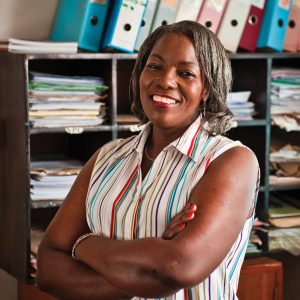 Clementine is a single parent with one child and four dependents. She is HIV positive having found out about her status in 1998. She had contracted TB in that year and, as those who have TB are also suspected to be HIV positive (TB is known to be a co-infection or opportunistic infection of HIV), a friend encouraged her to have a test for the virus. At that time, there was no VCT as counselling was not available. Nonetheless she went for a test. When she learned she was positive, Clementine was devastated and could not sleep for two days but soon realised that if she continued in that way she would not survive for long. Since then she has lived positively.
Clementine is a single parent with one child and four dependents. She is HIV positive having found out about her status in 1998. She had contracted TB in that year and, as those who have TB are also suspected to be HIV positive (TB is known to be a co-infection or opportunistic infection of HIV), a friend encouraged her to have a test for the virus. At that time, there was no VCT as counselling was not available. Nonetheless she went for a test. When she learned she was positive, Clementine was devastated and could not sleep for two days but soon realised that if she continued in that way she would not survive for long. Since then she has lived positively.
As Clementine had been stigmatised by her office supervisor over the TB, she decided not to inform anyone of her HIV positive status but her boss called meetings which excluded her.They discussed how to deal with Clementine as they thought she would infect them all, however fortunately for her, the rest of the staff were very supportive. When she was tested for TB, she was told that it was non-infectious, so she continued working. Her boss did not believe that she was not infectious, and arranged for everyone in the office to go for TB screening. Nobody went for this screening except her boss. But Clementine was psychologically affected by all of this.
it will take all of us to stand up and speak one word
Her boss then asked the Administrator to tell Clementine not to touch any of the office tea cups, plates or spoons in the staff room. Despite this action, Clementine felt relieved because she thought she was going to lose her job. But Clementine now has a new boss, and things have improved greatly.
Clementine is very open about her status but thinks people do not believe her some times because of how healthy she looks. Despite the cost, Clementine began taking ARVs in 2000 having bought them from Botswana as ARVs were more expensive at that time in Zambia. However, she could still not afford to continue with the treatment as they still proved to be expensive. And so, Clementine only took the ARVs for three months, but later with the help of friends she resumed medication.
As time passed, subsidised ARVs were made available in public institutions though there was still bureaucracy to access them. Clementine realised that some doctors did not inform patients that they were subsidised ARVs and continued buying from Drug Stores at a full cost. In 2005, the Late President, Levy Patrick Mwanawasa, SC. announced that ARVs should be provided for free to all those who required them.
The side affects of ARVs are challenging, having to take the drugs every day for life, Clementine has lost fats in her face, her stomach has grown big and her legs become small (like sticks).
But the greatest challenge arises from the attitude of friends who, once they hear of her status, disappear from her life. This, she comments, makes you wonder whether you should tell people or not. You can get very lonely, but you don’t have anyone close to you. Once she opens up, she feels better.
Clementine feels that people have become complacent because of the introduction of ARVs and insists that the emphasis needs to firmly remain on prevention and on sensitising people about HIV, speaking about what is happening ‘on the ground’. ‘We need to use role models more because some people still dont think the virus is real. If the public can see how others have living a positive and productive lives , it will help remove stigma and will also help reduce discrimination. There are many who cannot read or write, especially in English, it would also help if information was simplified and also made available in at least the seven main local languages’.
Clementine insists that leadership is key in the fight against HIV and AIDS. She would like to see the President taking a key role say, for example, going for VCT – leaders are supposed to lead by example.
She believes that it will also take a few brave women going into the communities, encouraging other women to stand up and speak. ‘Women have to learn to stand up and defend ourselves because no one will do that for us. You have to stand up and be assertive because there are very few women who will stand up and say no. Women need to tell men enough is enough, but this will take time – it will take all of us to stand up and speak one word, otherwise we are going have a big battle to win. Not many people are taking the lead especially leaders’.
Losing people to HIV related illnesses has made Clementine strong. She lost two young sisters. It has given her a vision of where she needs to go in life, what she needs to do. It has affected her in that she cares for the dependents of her loved ones, two of whom are HIV positive; one of the children has cerebral palsy, and needs a lot of care as she cannot do most of the things on her own. ‘Most households in Zambia have a number of orphans and it takes a lot to care for them, feeding them, clothing them, taking them to school, helping them have a normal life. You have to provide for everything, not just shelter’.
Eric A. Mubita
Father, support worker
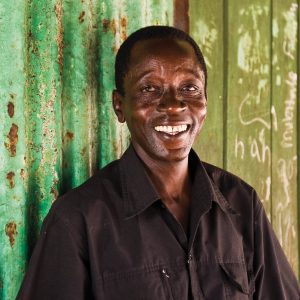 He is forty eight, is married and has three children, two boys and one girl. He lives by cultivating the land, growing maize and rice. For the past two years he has worked with TALC doing outreach and advocacy work and he has been involved with the AIDS Alliance. Before accurate information was provided, people believed that HIV and AIDS just involved someone who was having sex with a woman during her period – Malili. But this has all changed now.
He is forty eight, is married and has three children, two boys and one girl. He lives by cultivating the land, growing maize and rice. For the past two years he has worked with TALC doing outreach and advocacy work and he has been involved with the AIDS Alliance. Before accurate information was provided, people believed that HIV and AIDS just involved someone who was having sex with a woman during her period – Malili. But this has all changed now.
While Eric was married, he travelled up and down the country for his father collecting orders for his shop. This is when he contracted the virus. He used to travel to Livingstone and the Copperbelt where they were ordering clothes and groceries. On these trips, he would meet lots of different sexual partners but in 2007 he began to feel sick. His dad encouraged him to go for medication and accept his status. Eric felt very ashamed when he found out he was HIV positive, but his wife agreed not to leave him. Initially his wife thought it would be better not to take the drugs and to die, but she slowly changed her mind. They went together when he went for VCT, she did not blame him.
…behavioural change is the only thing which can make this country a better country
His first son is positive, but his other children are negative. The people in the community knew Eric was positive because he was sick. Eric’s family would be considered high class in the community. People did not believe that he was positive because he was so fit, due to the drugs. They would ask Eric to assist their relatives who were sick, and give them counselling so they could get better. His father, who is ninety one years old, did not react. His children were worried, but he educated them that would be ok, and now they support him. His youngest tells him when to take his medication, his wife is also on ARVs. They began ARVs straight after VCT. Eric got pneumonia and his wife got a rash, but they overcame these problems.
Their main challenges for them are that clinics and hospitals can run out of medication sometimes with such a large area to deal with. The CD4 count machine is a significant challenge as it frequently breaks down. More sensitisation is needed if the prevalence rate is to decrease. There is a need for a lot more sensitisation work in the area.
Cultural practices contribute greatly according to Eric. There is a practice where if someone is suspected of being poisoned by witchcraft, they cut the person with a razor blade and syphon out the blood with a horn (mulumeho), to get rid of the poison. Circumcision is also an issue. One knife is used for fifteen to twenty children, so the virus can be transmitted this way also.
Eric argues ‘it is better for us to fight this pandemic, especially with initiation ceremonies – behavioural change is the only thing which can make this country a better country. Information dissemination is key. There is too much sexual activity’.
Florence Hagila
Farmer, health centre volunteer, counsellor
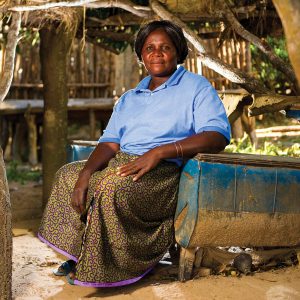 Florence is forty. She is married with seven children, four of whom are married, two have just finished school, and one is still in school. She herself left school in Grade 10. She also has three dependents, all of whom are orphans because their parents died from HIV related illnesses. She is a farmer growing tomatoes, maize, ground nuts and sweet potatoes. She is the local chairperson of SWAAZ in her village Mulendi, volunteers at the local health centre and visits the local community areas. She instructs people on how to use things like mosquito nets and on personal hygiene and family planning. She gets condoms from the health centre and distributes them in the communities she visits.
Florence is forty. She is married with seven children, four of whom are married, two have just finished school, and one is still in school. She herself left school in Grade 10. She also has three dependents, all of whom are orphans because their parents died from HIV related illnesses. She is a farmer growing tomatoes, maize, ground nuts and sweet potatoes. She is the local chairperson of SWAAZ in her village Mulendi, volunteers at the local health centre and visits the local community areas. She instructs people on how to use things like mosquito nets and on personal hygiene and family planning. She gets condoms from the health centre and distributes them in the communities she visits.
Women are very affected because they do not have any power within society. Men can infect more women, because they can propose to more than one woman
One of Florence’s main problems with the distribution of condoms was that when she gave them to women, their husbands refused to use them because they said that sex is not good when using a condom. So Florence changed her strategy. She decided to start distributing female condoms to the women instead and instructs them to put them in before the husbands get home, and then they will not notice it. Florence is not a shy person, so it is easy for her to talk about condoms, despite the fact that many people think it is still taboo for a woman to discuss this. She says that although some people may be HIV positive, they still have sexual feelings. She encourages them to use protection to stop further spread and re-infection. She feels that she is making progress because people are more open to talking about and using condoms. Some people still have reservations, but things are changing. She has been directly affected herself by HIV because she has lost a number of family members to the disease, and cares for a number of orphans.
Florence feels that as so many people are infected, she is not sure if it is men or women who are most affected. What is important to her is the need to use condoms and to go for VCT. Women are the most significantly affected because they care most for those who are infected, and caring for orphans usually falls on them. Because women stay at home, not many of them have access to adequate information about ARVs and so on. They see their husbands taking drugs, but they do not know what they are.
Women are also very affected because they do not have any power within society. Men can infect more women, because they can propose to more than one woman.
The reason Florence went for a test was that she was involved with DAPP and they encouraged her to go for VCT. She was very scared, but she asked her husband to go with her so they could go together and find out together. They went as a couple in 2009 and in 2010 and both tested negative.
Florence received training from the Rural Health Centre where she volunteers and where she focuses on VCT especially for couples. She remembers one couple where the man was positive and the woman was negative, and she counselled them on how to have safe sex and look after one another. This is typical of her work.
She became involved as a result of listening to a radio programme one day where a nun spoke about HIV and Florence realised that within her community, people did not have this information. She felt compelled to do something for her community, so she went to the Rural Health Centre and became a volunteer. She also helps set up support groups to work alongside the Health Centre. That was some two years ago and there are now are now nine support groups within the area covered by the Mulendi Neighbourhood Health Centre.
Florence visits people who are sick and who are taking ARVs. She goes to their house and helps them with some cleaning and collecting of fire wood, depending on how well that person is. She and the other volunteers offer advice and encourage people to socialise and not lock themselves away and get depressed. Sometimes they also cook for them.
The world is cruel sometimes and that HIV and AIDS are not curable, but that it is not the end of your life. People can still have negative children if they are positive, so long as they find out how to protect their child, and follow the instructions they are given. I feel sad and angry about people who deliberately infect others.
Despite her religious beliefs, Florence promotes the use of condoms. If people do not use condoms they will become infected and die, then there will be no one left to go to church. They are better off going to church alive and using condoms.
Godfrey Malembeka
Ex-prisoner, prison reform activist, care worker, teacher
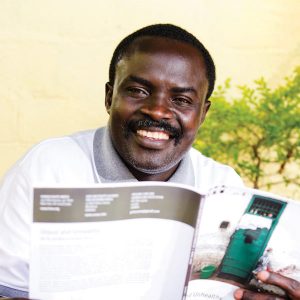 Prisons Care and Counselling Association is a Prison Cell NGO formed in 2000 by ex-prisoners which deals with male and female remandees and convicts as well as illegal immigrants to assist in the rehabilitation of both prisons and prisoners. It focuses on the improvement of the physical conditions in prisons – improving cells, building schools etc. – and on education – running classes on a broad range of topics including HIV and AIDS, human rights, drugs, mental health etc. Most of the prisoners, especially the female prisoners are illiterate and this makes them vulnerable. Most of the current female prisoners are divorced because once a male partner realises the woman is going into prison, he will divorce her – ‘Men in Zambia are not ready to wait for their wives, but the wives wait for the husbands. We are trying to balance that scale.’
Prisons Care and Counselling Association is a Prison Cell NGO formed in 2000 by ex-prisoners which deals with male and female remandees and convicts as well as illegal immigrants to assist in the rehabilitation of both prisons and prisoners. It focuses on the improvement of the physical conditions in prisons – improving cells, building schools etc. – and on education – running classes on a broad range of topics including HIV and AIDS, human rights, drugs, mental health etc. Most of the prisoners, especially the female prisoners are illiterate and this makes them vulnerable. Most of the current female prisoners are divorced because once a male partner realises the woman is going into prison, he will divorce her – ‘Men in Zambia are not ready to wait for their wives, but the wives wait for the husbands. We are trying to balance that scale.’
We look at the plight of women with the ir children in prisons – they are known as circumstantial children – born and brought up in prisons. We are building nursery schools and we want children to go to school with prison officers’ children and other inmates children because they are free but inside. Zambian society is not ready to look after a prisoner’s child.
We approach the issue of HIV and AIDS from, for example, the drug abuse angle. When you look at modes of transmission, you cannot separate it from drug abuse. We focus on drug abuse sensitisation; we want inmates to know the long and short term effects of drug abuse. We know that drugs give them courage to commit sodomy and many of the other things they are involved in. The hottest or quickest mode of transmission is actually sodomy and homosexual activity in the prisons because condoms are not allowed!
We also focus on human rights, natural rights, which prisoners have even if they are incarcerated. They have rights to eat three times a day, to adequate shelter, to decent clothing, health treatment – these are not privileges. The Zambian prison system is designed to accommodate 5,500 prisoners but actually has about 16,000 plus at the moment, so serious congestion is a big problem. So when we talk about blood and air-borne diseases such as TB, HIV and AIDS, the prison environment is very conducive to these diseases.
We want the justice system to respond by resorting to non-custodial sentencing, there are a lot of people in prison today for petty offences and these people should be outside, they should be given fines, suspended sentences, they should be given community based sentences. We are also looking at empowering women in prison, we want to help them so that by the time they are leaving prison they have some capital and the possibility of a new life, perhaps with their partner.
The main contributing factor to the vulnerability of our women is the Prisons Act itself which empowers the officer in charge to select who should be treated at the hospital on any particular day (even if a doctor has already recommended treatment). The officers have the final say on who may be allowed to go for treatment – this is creating a lot of problems for women as these officers or wardens in charge are not medical officers. It should be a basic right for women that they are attended to by a doctor.
We have 86 prisons countrywide but only 15 prison based clinics. 33 of these 86 prisons are open air prisons, these are a little bit better because prisoners are allowed to walk, to go all over, there is less security – but the 53 penal prisons must have clinics.
The vulnerability of our mothers, our women, is higher than that of our male convicts; if a person who is not expectant is finding it difficult to access treatment, what about the expectant mothers, who have to deliver in prison? The current situation does not cover the babies born adequately, in terms of basic provision. So you will find that expectant mothers are incarcerated twice – they are incarcerated mentally because they are thinking of the baby, and their actual incarceration. So looking at mental health, you will find that the level of disturbance among female prisoners is higher than among men. Another problem under the Prisons Act is that wardens can transfer prisoners and often when they are transferred their files are not transferred with them, causing medical and other difficulties. There are considerable problems associated with medical records which are constantly lost impacting directly on treatment for HIV and AIDS.
Women are in effect serving three sentences:
- as their husbands have divorced them
- because they are worried about their babies because they cannot feed them properly or care for them properly
- then the years that they are actually serving.
Obtaining CD4 counts is also problematic as the system does not have CD4 count machines; people can be tested, but if the viral load is not known, they cannot be put on drugs unless they are escorted to a bigger hospital. We need to attend to our women quicker and more effectively. They are in a worse condition that men, especially because they don’t have people who will visit them to support them. The men in the prisons always have their wives, mothers, sisters – there is always a queue.
There is also an issue of food supplements. We are given strong drugs but not fed three times a day and the food is not balanced. People are given 350 grams of food a day and it is always the same food. 350 grams of rice, or of maize meal. There is nothing else: no oil, no ground nuts. We work with prisoners to develop their own gardens so vegetables can be available.
The law that governs prisons was made so long ago it is actually outdated; it does not take account of international law or standards. If you examine the law you will see that women are not even allowed to go into prison with their underwear! How are women supposed to survive like this?
And then there is the issue of drugs. One of the main reasons why women are in prison is because they are used as drug mules; they are asked by wealthy men to transport drugs from one country to another, or even within the country. Some of them are in because they were selling marijuana, some for selling game meat, some are in because they were fighting; some are in for armed robbery. We have people remanded in prisons sometimes for 5, 6, 7 years, while they are waiting for their case to be heard; their records are gone, the arresting officers don’t turn up etc. These things can drive you to drugs.
We have opened up ‘site clubs’ in prisons – for example Lusaka Central Prison has a PRISCCA Site Club with a full committee of officers, trustees, teachers, lawyers (some of whom have been incarcerated) – they are designing lessons on issues such as HIV at the level of the prisoners and in languages they can understand. Some prisoners are trained as Peer Educators, so that when they are in the cells at night time, they can teach and talk about the issues.
Stigma is still a problem, and there is stigma within the stigmatised community. Prisoners are stigmatised by the outside community and then, those who are on ARVs in prison are also stigmatised.
Women are in effect serving three sentences:
- as their husbands have divorced them
- because they are worried about their babies because they cannot feed them properly or care for them properly
- then the years that they are actually serving.
It is always the women who support these women in the prisons, I go on the radio to talk about this and the response from men is ‘why do you support these women, they are harlots! Why should you make the environment in prisons better for these women’. But the response from women is different ‘Any person can land in prison; continue the work you are doing. Where can I find you because I have these shoes.’
The rural areas are worse for the women. In the rural prisons, there are no lawyers, they follow the judges. Judges need to be sent to the provinces, we advocated for that and luckily the government listened. They are sending judges to the provinces next year, and the lawyers will follow. In rural areas, some women have to deliver in prisons with no water, no electricity. We have to supply them and their babies with clothes.
I suffered heavily in the congested prisons. Most of the things that go on in prisons are not seen or heard of outside. It was very bad, especially when there was cholera. I saw my friends wrapping themselves in newspaper and plastics to try and stop the infection…you are supposed to be fed three times a day in prison. For four years, I was fed only once a day; sometimes you just feed on bean soup… you would not believe how bad it was. But still I survived. I was bitter with the justice system after this.
Juliana Meleki
Deputy head teacher, care provider
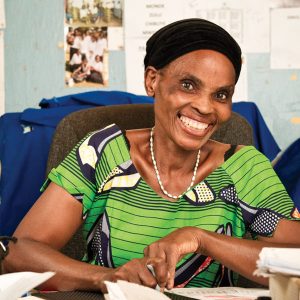 Juliana is fifty four. She is living positively with four children and is Deputy Head of the Christ the King Basic School. She was promoted in 2004 to Deputy Head and is in charge of special education, teaching braille and other subjects. She personally transcribes braille for five blind children in the school because the school has no braille machine. Juliana discovered her status in 2005. Juliana was never sick, but had herpes zoster on her left side for which she was given medication in the clinic and it went away. Subsequently, her mother came to see her and told her she had lost weight and did not look well. She encouraged her to go for VCT following which Juliana was told she was HIV positive. She was obviously upset but she said God had put her in this situation, so she must accept it.
Juliana is fifty four. She is living positively with four children and is Deputy Head of the Christ the King Basic School. She was promoted in 2004 to Deputy Head and is in charge of special education, teaching braille and other subjects. She personally transcribes braille for five blind children in the school because the school has no braille machine. Juliana discovered her status in 2005. Juliana was never sick, but had herpes zoster on her left side for which she was given medication in the clinic and it went away. Subsequently, her mother came to see her and told her she had lost weight and did not look well. She encouraged her to go for VCT following which Juliana was told she was HIV positive. She was obviously upset but she said God had put her in this situation, so she must accept it.
Go right away to know your status. If you do not know your status, you are killing yourself. ARVs prolong your life.
Juliana’s CD4 count was too high for anti-retrovirals (ARVs), so instead she was just put on a nutrition programme. Juliana is under a lot of stress at home as she has been looking after her husband since 1998 when he became unemployed and, as a result, Juliana is the breadwinner. She had to buy the house for them. Juliana started taking ARVs in 2007 and takes one tablet per day and since starting on them, she has become physically fit and can do anything. Her sight was poor for two weeks when she began taking her ARVs, but now her sight is fine.
Her husband did not ask her how she was or about her results when she came back from VCT. Juliana told him the next day that she was HIV positive. She told him ‘that this is how we have to live in this house – we either use a condom, or abstain’. He did not respond and refuses to use a condom insisting he is negative, but she is not sure about this. So from 2005, she has been abstaining. Her children are very supportive of her – they took it well and said ‘It has come. There is nothing we can do’.
I remember, when I went to see the counsellor, I told him that my husband was being promiscuous, so I confronted my husband saying ‘you know, what you are doing is not right. You will bring that disease into the house’. Then the woman he was with died, and I said ‘I told you’.
Juliana thinks women are more vulnerable because they follow the tradition that you cannot say no to sex with your husband. Most women are not economically empowered so they end up engaging in sex for money.
Juliana was not stigmatised when she disclosed her status. She told everyone straight away including her Head Teacher. She joined a support group and told the other teachers. People asked her, how is she so courageous, but she said, ‘I have to be, there is nothing I can do with the way I am. I am a happy person’.
Kelvin Wamunyima Sifanu
Fisherman, migrant worker
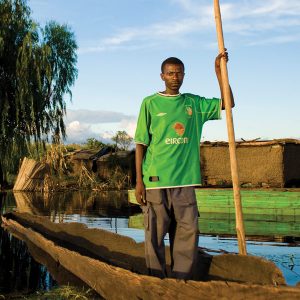 Kelvin is forty years old and a fisherman by trade. He is not married, but he has a three year old child. He is a migrant worker and comes to Mongu from May until December to fish as fishing is prohibited at other times in order to let the fish breed and the water is too high between March and May. The fishermen migrate between the different fishing camps on the plains. The camp Kelvin goes to is Nandombe near Mukoko. During the fishing season, they camp near the banks of the Zambezi River and Kelvin fishes in one of its tributaries. Life among the fishermen is hard as they live in temporary huts which often get washed or blown away.
Kelvin is forty years old and a fisherman by trade. He is not married, but he has a three year old child. He is a migrant worker and comes to Mongu from May until December to fish as fishing is prohibited at other times in order to let the fish breed and the water is too high between March and May. The fishermen migrate between the different fishing camps on the plains. The camp Kelvin goes to is Nandombe near Mukoko. During the fishing season, they camp near the banks of the Zambezi River and Kelvin fishes in one of its tributaries. Life among the fishermen is hard as they live in temporary huts which often get washed or blown away.
Kelvin begins fishing at about 20:00 and continues through the night, returning to sell the fish in the morning at about 05:00 where the fishmongers wait. Depending on net size, there can be up to four people on each net. When they return from a night’s fishing, some sleep while others often go drinking. Kelvin feels that the issue of HIV and AIDS is very significant. Fishermen do not usually bring their wives and partners with them when they go fishing and as many of the fishmongers are women, the situation can be difficult. If a woman refuses to have an affair with a fisherman, he can refuse to sell his fish to her until she does. It is common that a woman will come to buy fish and sleep with one man on one day, and then the next day with another. Some can even have three or four men in a few days. If any of these are infected, the virus can spread quickly.
Kelvin argues that because the area where they are is so rural, there are few people to teach about HIV and AIDS and that, as a result, not enough people know enough. He does not know of any organisation that teaches about HIV and AIDS in this area. While some people go to the hospital to get condoms, he believes there is little condom use in the fishing communities, despite the amount of sexual activity. Some people in the area know their status, and continue to have unprotected sex because they say they do not wish to die alone.
…not enough people know enough
He has been for VCT a few times, and is negative. He tries to educate people about HIV, because he has an advantage as he lives half of the time in an urban area, and half of the time in a rural area. But some remain uninterested. Kelvin argues that every Zambian should go for VCT so that they can take care of themselves. Above all, if they are in a relationship, they should stick to one partner and be safe.
Mate Imenda
Subsistence farmer, mother, support worker
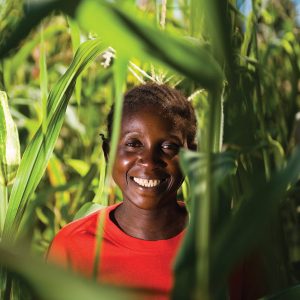 Mate is a single, forty-two year old, small scale farmer. She lives with her uncle, her father’s younger brother in Mulamba Compound. She says life is very hard for two reasons – she does not always have access to land to farm and because, since 2002, she has had a rash all over her body.
Mate is a single, forty-two year old, small scale farmer. She lives with her uncle, her father’s younger brother in Mulamba Compound. She says life is very hard for two reasons – she does not always have access to land to farm and because, since 2002, she has had a rash all over her body.
Mate was married for ten years. She has five children with two different fathers. When she moved to her husband’s village Mukule, she began to develop the rash and her father-in-law told her to return to her own people, as they needed to find a new wife for his son. She was chased away from the village in 2008. She does not know if her husband was HIV positive but he insisted he would rather listen to his father than defend her. He told her to leave, but she did not have the money for transport back to Senanga.
…women are more vulnerable because they sometimes use sex to generate an income
Her father-in-law insisted that she not be given food by anyone else in the village, including her children. Mate could not farm at the time because her rash was so bad. She had to sit under a mosquito net for days because if she went out, the flies would attack her sores. She could not even hold her child. Most of the time she spent in the net, she prayed to God to die, but was worried what would happen to her children if she did.
There was one woman in the village who helped Mate and supplied her with a small amount of food. She then asked if Mate had any relatives who could help her and Mate told her of her uncle in Senanga. The woman’s son located her uncle and informed told him that Mate was going to die at any time. The uncle came to collect her and took her and her children back to Senanga, even though he is very poor and has little. Mate then went to the hospital to see if she could get treatment. While she was there, she heard people talking about HIV and VCT. She was tested and learned she was positive. After being tested, Mate went to get her CD4 count, but at that time, the machine was broken and Mate had to wait four months for it to be repaired. Then her CD4 count was too high, so she was not put on ARVs. She was also found to have an STI and received treatment for it. She began to take ARVs in January 2009.
Mate did not feel too bad when she was diagnosed, because she knew people got better once they started taking ARVs. She was relieved because it gave her a solution to her problem. While she did not have many problems with the medication, the rash did not go away easily. She was given different medications and now the rash is beginning to clear. Mate has to walk for one hour to get to the clinic.
Her uncle is very supportive and does not blame her for her situation. Oliver, the NZP+ co-ordinator in Senanga encouraged her to have her children tested with the result that one of them is positive. Mate thinks it was her husband who infected her because he was having an affair with another woman whose husband was very sick. Mate’s former husband and his new wife have both died.
For Mate, women are more vulnerable because they sometimes use sex to generate an income. Mate is now a member of a support group and enjoys being involved – she is learning a lot while also helping others.
Maureen Mwape
Grandmother, caregiver, subsistence farmer
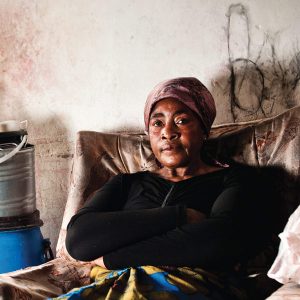 Maureen is sixty. She had three children but they have all died. She now cares for her grandchildren. ‘Community life can be very hard because there are so many orphans, no parents and, at times, there is no food. Sometimes the children have to work for people in order to get fed’. Sometimes Maureen cooks a lot of food and invites the children from the area to come and eat.
Maureen is sixty. She had three children but they have all died. She now cares for her grandchildren. ‘Community life can be very hard because there are so many orphans, no parents and, at times, there is no food. Sometimes the children have to work for people in order to get fed’. Sometimes Maureen cooks a lot of food and invites the children from the area to come and eat.
She decided to go for VCT because of her husband’s lifestyle. He was always moving around, meeting different people and finally he left Maureen to live with another woman in Ndola. When she learned she was positive, she prayed. She goes for CD4 count every three months and is not yet on medication because her CD4 count is still quite high. She is not in touch with her former husband anymore so she does not know his status.
Maureen does small scale farming in her village and sometimes she does some piece work. She lives with her three grandchildren, all of whom attend school, since it is free although she has to provide their books and bags, etc.
Maureen has not experienced stigma in her family or community. People have approached her for advice and she tells them about personal hygiene and eating correctly. She says that within her family and community, they sit together and talk about the issues, and teach each other how to stay healthy. She has educated her grandchildren on how to do the farming so that they can provide for themselves in case she becomes ill.
Women are moved by the situation, so they care for people
Maureen insists that programmes that are meant for those with HIV do not reach village level. They get to organisations or clinics but there is insufficient sharing with the communities. Women are the most vulnerable as they are the ones who always care. Men would rather just leave. Women are moved by the situation, so they care for people.
For Maureen, village voices need to be heard. In terms of access to necessities, they get paid or work for food or soap. Access to these things is not easy for her and work is hard. People come from town and need someone to weed their garden, so she weeds and then buys shoes or clothes for her grandchildren.
She grows cassava, maize and sweet potatoes, groundnuts and beans for the family. They keep the seeds so they can grow them the following year. During the rainy season they would go into the field at 06:00 until 10:00 – that is the busiest season.
Mercy Ilitongo
Widow, mother, peace worker
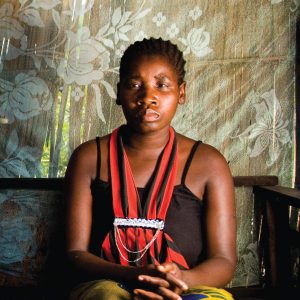 Mercy’s husband died in October 2009 and she is now a widow with four children, all of whom have been tested. They are aged twelve, nine, seven and two years. The youngest is positive and on medication. She was a twin, but the other twin died at age two. Mercy is not working and survives doing some washing and cleaning in houses in the community in exchange for some money and food. Mercy is illiterate. She rents her house for K30,000 per month but it is very hard for her especially in the rainy season as the rain enters her house.
Mercy’s husband died in October 2009 and she is now a widow with four children, all of whom have been tested. They are aged twelve, nine, seven and two years. The youngest is positive and on medication. She was a twin, but the other twin died at age two. Mercy is not working and survives doing some washing and cleaning in houses in the community in exchange for some money and food. Mercy is illiterate. She rents her house for K30,000 per month but it is very hard for her especially in the rainy season as the rain enters her house.
As her husband died, Mercy went for VCT and after a month she was diagnosed positive but was not too scared as she knew she could get medication to help her so she could be alive with her children. Her child was also tested at the same time and started medication also. It takes about an hour for her to walk to get their medication and she usually has to queue for a couple of hours. Mercy and her daughter take their medication at 07:00 and 19:00 but, they have problems getting adequate food. Mercy does not mind not eating herself but it is more difficult for the children because they do not understand.
It is more difficult for the children because they do not understand
Mercy suffers a bit from discrimination and stigma in her community, for example, sometimes if they are sharing food, or eating together, people will not eat from her plate if she has left some food because they are afraid they will become infected. She thinks that it is just from ignorance that they do this. It annoys her, but she tries not to pay too much attention because she does not want to get upset and depressed as this will make her weaker.
If something were to happen to Mercy, she is not sure who would look after her children because her relatives are very far away. She is the only one left of fifteen siblings. Her mother has passed away, and her father is still in her village and pays no attention to her. She has to remain strong so she can care for her children because no one else will if something happened.
Mercy thinks HIV is spreading because so many people in her community have it. People continue to drink too much and this makes them more susceptible to becoming infected. She insists that people should not sleep around and even in a stable relationship, condoms should be used because there are other STIs to worry about.
Mercy is thankful for the free medication because, due to the levels of poverty around her, she would not have been able to afford the medication otherwise. Mercy would be dead without it. She thinks parents need to be very careful and look after themselves so that they can care for their children, to stop children living on the streets.
Misheck Akatumwa
Counselor, peer educator, support group member and leader
 Born into a family of five boys and two girls, Misheck is a counsellor by profession and started working with ARHA while he was in school. This experience encouraged him to continue and to study counselling. He began work in Lewanika General Hospital in Mongu, where he delivered VCT services. He then began doing home-based care after completing his studies. He enjoyed this work because he met and supported a lot of different people, some negative, some positive. He also found it hard because he found it difficult to give people the results when they tested positive.
Born into a family of five boys and two girls, Misheck is a counsellor by profession and started working with ARHA while he was in school. This experience encouraged him to continue and to study counselling. He began work in Lewanika General Hospital in Mongu, where he delivered VCT services. He then began doing home-based care after completing his studies. He enjoyed this work because he met and supported a lot of different people, some negative, some positive. He also found it hard because he found it difficult to give people the results when they tested positive.
But with time, he got used to this and now enjoys the relationships he is able to build with his clients. He says that after counselling, the relationship with the client does not end there. He makes follow up calls to find out how people are doing, if they are having any difficulties in terms of medication or any other challenges such as stigma or discrimination. He developed his interest for this work after attending a workshop on behaviour change. He admired the work people were doing and first wanted to work as a nurse or a doctor, but that did not work out. He knew he wanted to help people, so he decided on counselling.
Once people know their status, then they can know how they need to live.
Misheck argues that HIV and AIDS are definitely spreading among young people. If someone has a girlfriend, that girl may have another boyfriend also, sometimes an older man. The pandemic is spreading because people lack access to effective and appropriate information. Even those educating on the issue often do not have accurate information. Sometimes, Misheck argues, those very HIV and AIDS educators leading workshops go in search of girls after they finish and, as a result, people lose trust in them because of their behaviour.
Misheck feels he has achieved a lot with those he has helped. Before they were tested, they were very sick, some could not even walk, but now that they are on medication and have been supported they can walk again. They are much healthier and some are working with other support groups. Around 20 support groups have been set up for about 200 young people living with HIV and AIDS in Mongu. Previously, they were living with stigma and discrimination but this is now beginning to change.
Misheck goes for VCT frequently, every 3 months. People think the only way to become infected is by having unprotected sex but this is not true. On one occasion, while doing home-based care, he was splattered with blood from a person who is HIV positive. He waited 3 months to do a test, but it came out negative. He was quite scared when this happened, so now he goes every 3 months to be tested. Misheck’s girlfriend is also a counsellor and works at the Lewanika General Hospital in Mongu. They go for VCT together.
He lives in the same community as Kahilu (an ex-sex worker). She knew him as a counsellor but did not approach him to seek help until very sick. He encouraged her, by counselling her on HIV and AIDS (he carries out door-to-door education in the community). After that, she went for VCT with her friend and they both got tested and were found to be positive. After being hospitalised for over a month, Kahilu began taking ARVs.
Misheck has worked with a number of sex-workers, helping them to get tested and to access ARVs if necessary. Misheck has supported sex workers in becoming peer educators to get different work and cease selling themselves for sex.
It is difficult to support people like Kahilu now because there is not enough funding anymore to discourage them from going into town. If there is no support, they will most probably go back to sex work. Misheck feels like he has failed when things like this happen, because he has not been able to help them as much as he should.
People need to know their status. Sexual intercourse is not the only way you can become infected, there are many ways. Once people know their status, then they can know how they need to live.
Misheck argues that the government needs to be more serious about rural people. Urban areas have a lot of information, but the information does not spread effectively. Some people don’t even know about condoms or do not have access to them. More education is needed and Zambian leaders need to be role models.
Nathaniel and Beauty Mulele
Discordant couple, parents, small scale traders, students
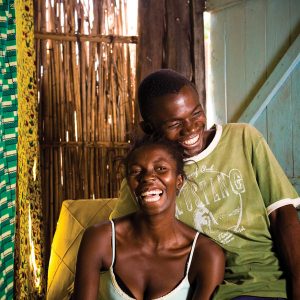 Married for four years, Nathaniel (twenty seven) and Beauty (twenty) have one child, Nathaniel (after his father). They live in Lubosi where life is difficult with most people unemployed surviving through small scale business activities or cleaning or working as guards. Nathaniel and Beauty sell maize which they buy from farmers in Kaoma. They buy 50kg for K50,000, then divide it into small buckets which they sell for K10,000 in the market in Mongu.
Married for four years, Nathaniel (twenty seven) and Beauty (twenty) have one child, Nathaniel (after his father). They live in Lubosi where life is difficult with most people unemployed surviving through small scale business activities or cleaning or working as guards. Nathaniel and Beauty sell maize which they buy from farmers in Kaoma. They buy 50kg for K50,000, then divide it into small buckets which they sell for K10,000 in the market in Mongu.
In 2005, Nathaniel went for VCT in the clinic in Mongu. He tested positive. He was pessimistic at first but with counselling, he began to feel significant more positive but it took him two months to learn to cope with the situation. He is not on ARVs, but was given Septrine, a medication for infected men. Nathaniel and Beauty were not married when he went for testing but he did not tell her of the result until she found the papers he was given at the hospital. Beauty confronted him and while he expected her to be angry, instead she comforted him. Beauty stays with him because of the love she has for Nathaniel.
There is a time for everything
Beauty says she was very disappointed that he did not tell her about his status, but supported him anyway. She was pregnant when she found the papers so she went for VCT and was found to be negative. She went again after she gave birth and was still negative as is their baby. Beauty told her parents who were very supportive as they are also a discordant couple meaning that her father is positive and her mother is negative.
People in the community do not know of Nathaniel’s status, because he does not talk about it with them. He feels maybe now is the time for them to find out, saying that there is a time for everything. Nathaniel and Beauty feel that as human beings, they are entitled to a sex life and they use condoms routinely.
They argue that HIV and AIDS affects all of us in some way. If you are in a discordant relationship, this should not separate you. Couples should continue being together, because the love they have for each other will support them. Nathaniel believes women are more affected by the virus, because they are sexually vulnerable, especially due to the myth that sex with a young girl can cure AIDS. Also, too many women do not get to choose if they use a condom or not.
They feel that everyone has rights and that these rights should be upheld by the government and that all financial support given to tackle AIDS must reach those who need it most. Also, they feel strongly that there should be no discrimination in employment.
At present, Nathaniel is studying to become a mechanic at Mongu Trades School.
Patricia Pumulo
Business woman, mother, wife
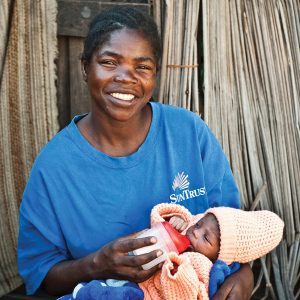 Patricia was born in 1976 and has given birth to nine children but five of them died. She is married to Kayama who is 31 years old and works as a security guard in Mongu.
Patricia was born in 1976 and has given birth to nine children but five of them died. She is married to Kayama who is 31 years old and works as a security guard in Mongu.
Patricia is a small scale business woman selling roasted casava and ground nuts at the market in Mongu, which she buys from farmers in Kaoma. She rents her house in Mukoko for K25,000 per month. Life is tough in her community and most people survive through small business activity.
this can happen to anyone at any time
When she went for testing in 2007, she was four months pregnant; hearing that she was positive, she was very scared, but got advice on what to do next. She did not know anything about mother to child transmission, she delivered the baby at home because she did not realise she could infect the child during delivery and the child became infected as a result. After four months her child became sick, tested positive and was given medication and was then put on ARVs because both her and the child were very sick. Patricia and her baby were in hospital for 2 months but sadly her baby died at eight months; Patricia has now been on ARVs for 4 years and one of her two sons is negative and the other has not yet been tested.
Her husband, Kayama, was tested last year in the local health kiosk and was found to be positive having earlier being tested negative. They have been together for three years and he insists he did not know Patricia’s status until he tested positive.
There is stigma in the community and many people point at Patricia because she is on medication. Because of her counselling, she has learned to ignore it because it would only contribute to her sickness. She knows this can happen to anyone at any time, so it is best to ignore them.
Patricia thinks women are more vulnerable because of the different modes of transmission giving birth and helping deliver babies and using razor blades.
Oliver Liseli
Father, support worker, care provider
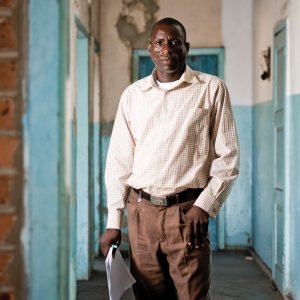 Oliver is forty four, married to his third wife and has six children. He divorced his first wife. He ran away from his second wife because he initially thought he was being bewitched but eventually discovered it was actually HIV. He moved to Livingstone and stayed there for three years but when he returned home, he still had the same health problems – a rash all over his body and constant coughing. He was tested for TB, but it proved to be negative. HIV tests were not done at this time.
Oliver is forty four, married to his third wife and has six children. He divorced his first wife. He ran away from his second wife because he initially thought he was being bewitched but eventually discovered it was actually HIV. He moved to Livingstone and stayed there for three years but when he returned home, he still had the same health problems – a rash all over his body and constant coughing. He was tested for TB, but it proved to be negative. HIV tests were not done at this time.
Oliver spent considerable amounts of money visiting witch doctors in search of a cure. He was a business man and eventually realised the problem was being bewitched. He was treated by a traditional healer for his rash, but almost died. Eventually he recovered and married his third wife, with whom he has been since. His second wife met someone else, but after a few years, she died.
All my children are HIV positive
Oliver obtained some information about HIV, and felt he might have the virus but was told that if he tested positive, he might die of depression, so he avoided being tested. He then began to realise that his ill health was out of control, so he eventually went for VCT in 2004 and tested positive. He had to travel to Mongu to get the drugs because at that time there were no drugs in Senanga where he lived. The drugs cost him K40,000 as they were not free at that stage. For Oliver, finding out he was HIV positive was a solution. He was relieved as he looked forward to being well again.
When he married his third wife, Oliver did not yet know his status. Four months after his marriage, he began getting sick again and was brought to hospital in Senanga for a month. He stayed with his wife until 2004 when he was tested. At that time his wife was pregnant, but when she gave birth, they lost the baby. When he was found to be positive, Oliver was too weak to get to Mongu to buy drugs and could not afford to get there either. His father had to sell a cow in order to pay for the medication. So in September 2004 he started ARVs, but was bedridden and almost died. However, eventually he responded well to the treatment.
Oliver decided to come into the open about his status so he could help his friends and family because he could see people around him who were very sick and wanted to help them and provide information. This is why he started a support group.
When he found out his status, his wife went for testing and tested positive. She started taking drugs, but did not respond well to the treatment. She is now on the second line of treatment but is still not responding. She is on tuberculosis (TB) drugs, and she also has a pelvic infection also.
Oliver says he became infected from being ‘too playful’ – from multiple partners.
ARVs are not a cure, he says, but can sustain health in your body. ‘You can remain healthy if you are taking them correctly, if you respond well’. As soon as he began taking ARVs, he began to feel better. Oliver thinks women are more vulnerable to HIV, due to poverty. Some women have no source of income, so have to engage in sexual activity. Women are also more vulnerable because they cannot negotiate condom use. According to Oliver, women need to be empowered socially and economically.
All of Oliver’s children are HIV positive and he argues that people are dying due to lack of proper information on HIV and AIDS, and it is difficult for people to access treatment in the district. There is only one CD4 count machine in Senanga and Sesheke District. It breaks down a lot, and some people have to wait months for tests. More ART is also needed and while ARVs are free, for some people they are not because they have to travel, pay for food and accommodation, etc. There are over five hundred people in Senanga district who have defaulted on their medication because of the distance they have to travel. Although we are addressing HIV, in another way we are promoting it, because people stop the treatment and engage in further sexual activity.
Theresa Mwansa
Orphan, ex-sex worker, member of a support group
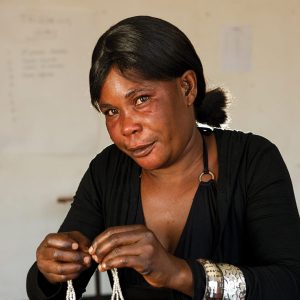 Theresa is thirty five years old and started working as a sex worker when she was sixteen, at that time she was in Grade 9 at Kasama Secondary School.
Theresa is thirty five years old and started working as a sex worker when she was sixteen, at that time she was in Grade 9 at Kasama Secondary School.
I started prostitution when my father died. My relatives took me in but did not care for me. They would buy books and things for their children, but never for me. So I started going out clubbing with my friends after school. We would bring clothes in our bags and change after school. Life became very difficult. I stopped going home because no one loved me there. Sometimes I would go to a friend’s house, or else I would just find a man and go and sleep and have sex with them. I didn’t care how old he was or whatever. I would just have sex with him.
We were three in our family. One died and my sister got married. She had a difficult marriage, so I could not go to live with her. I dropped out of school and became a sex worker full time. I would go to bars and clubs and have sex with men. I did not care if they were old, young, neighbour, whatever, 5 or 6 men in a night usually, so long as I got the money I wanted. I would raise maybe K600,000 or K700,000 and I would show off to my friends. A lot of friends joined me, because they were attracted to the money. There were 12 of us in a group working together but there are now only 2 of us left from that group of 12. 10 have died. We never cared where we went. We did not look out for each other. The only thing we did was to make sure we all had condoms.
There is a lot of support for each other in our group
Theresa says she used to keep female condoms. If the man refused to wear a condom, she would pretend to go to the toilet and put in a female condom.
It was uncomfortable to use them, but I put up with it, to protect myself, to save my life.
Theresa is now a member of a support group for former sex workers.
There is a lot of support for each other in our group. We care for one another because we understand. We all come from the same background, so we understand what we have all been through. I am so happy here. I have learned a lot. I can take care of myself. I have learned how to garden, to sew, tailoring and I have been for anti-drug training. There were a lot of challenges. A lot of the men were violent. There was a group of men who would take you to the graveyard, have sex with you and beat you, then just leave you there. Some would take you, give you money, beat you, take back their money and run.
I go for VCT every three months. The first time I did the test, it came out negative, but I did not believe it so I went to another clinic. Again, I was negative but I did not believe it again because of what I had done in the past. I went again to another clinic and was tested negative.
Everyone is at risk to HIV, especially those who are married. They are more at risk than any person. As for us who are not married, who just have sex with men, it is easier for us to tell a man to use a condom. In our culture, women have to submit to their husband. They cannot ask their husband to use a condom. If you are his girlfriend, you can say more, and you can tell him no!
If I met a young girl getting into prostitution, I would try to advise her not to because of the diseases. You need to respect yourself. I used to be violent and got no respect from people. Now I have respect from my neighbours in my compound. A lot of things have changed in me. I no longer sleep with lots of men. I used to smoke dagga and drink, I no longer do this. I used to fight, I no longer fight. I never had respect. I never cared for myself. I used to wake up and just go to the pub. Now I wake up and I clean my home and care for myself.
Susan Kekelwa
Volunteer, prison visitor, wife
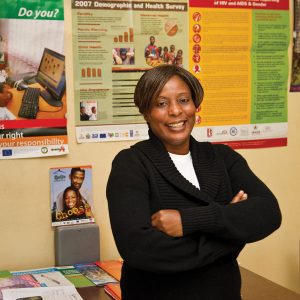 Susan Kekelwa is 36, married and her husband has three children from his previous wife who died. Susan does not yet have children.
Susan Kekelwa is 36, married and her husband has three children from his previous wife who died. Susan does not yet have children.
Right now I am a volunteer with the Network of Zambian People living with HIV (NZP+), and with the IEC (Information Education Communication) Advocacy programme also where I do advocacy work. I have been with NZP+ for seven years; I joined just after I discovered my HIV status. Since joining I have received some skills training in advocacy work and human rights for people living with HIV.
After I was tested and was found to be positive, I went for over a year without telling anyone about my status but later on when I began to get involved in the work and saw how people would not go for testing and I decided to disclose my HIV status to some people. Even now some people do not believe that I am positive, because I have managed to look after myself so well.
Know what you think, know what you do – you will live longer
I think I know how I became infected. I am not a person who had very many boyfriends, but I know one of them cheated on me. The other way I may have become infected is through being raped by a neighbour. It is only now that I realise how common it is that people violate other’s rights but the victim is too scared to do anything about it. We went to the police but they argued that maybe we had an arrangement with that man – the blame was being transferred to me. I have met the man since, his wife has divorced him and he is miserable. After this, it was very difficult for me to have a boyfriend because I couldn’t cope with it all. Now I’m not on any treatment. I just take good care of myself.
I met my husband through an organisation that visits prisons; he was in prison but very much willing to learn through the peer educators there. When he came out of prison, it was a while before I saw him, but eventually we did and he came to me and said ‘You are going to be my wife!’ I said, ‘I don’t think so!’ but I was wrong as we got married on the 22nd December 2007. When I told him my status, we decided to go for VCT together because he did not know his. We both tested positive so I took him through the process of accepting his status and caring for himself.
Now we live a very happy life, he is not sick nor is he on treatment. We are planning to have a child because with PMTCT it is possible. But I want to take my time and prepare and look at all the options of breastfeeding or not and things like this. When my husband came out of prison, he found it very difficult to get a job. We have an uncle who gave him a car to use as a taxi so we can manage life. So when we look at our situation to have another child right now, it would be a problem for us, we have to raise some money first. Now he has a job so we hope there will be a baby soon!
Women are more vulnerable to HIV; it is always the women who take the blame. If they are pregnant, get tested and are positive, the men say ‘you have brought the virus, you have been having affairs.’ When you see the statistics of NZP+, there are more women in our support groups than men – they are very, very vulnerable.
For Zambian women, they need to know it is a virus that lives in you, it is not going anywhere; what you are doing, it also does, you need to accept it. If I sleep, it is sleeping, if I eat, it is eating. If I am having a lot of sexual partners, it is also interacting with them because it is in me. We need to remember that what I am doing, the virus is also doing it. Only when you die, it will stop. People think that it is only when you are misbehaving that you will transmit the virus to someone else, which is not the case. This makes stigma worse because you think everyone is looking at you, everyone is watching you. If I look in Livingstone, I can be like a role model for the people because when they see me, they do not see the virus. I am open. I am not shy about it. If you do not open up and disclose it, it will eat you up! Women need to be strong and disclose their status, then you can survive.
For men, it is important for them to do couple counselling, they need to change their attitudes towards sex. They need to change their attitudes and behaviours or else it will continue. There are too many multiple concurrent partnerships.
My work in the prisons involves peer education, those in prison need to be cared for if they are HIV positive, food supplements are needed if a person is taking ARVs; they need to know how to care for themselves. For example, my husband is advocating for something to be done about sanitation, things are improving but diseases are still there though – TB, HIV, STIs.
Although people don’t want to talk about it, every person deserves a second chance. Not everyone accepted my husband at first but I told them he deserved a second chance. He knows God now, is active in the church and is a very happy person. He is just a man. Some people think ex-prisoners need to be condemned. Not me, no.
I hope other people will learn from me. Positive living is something you need to do and can do. Know what you think, know what you do – you will live longer.
